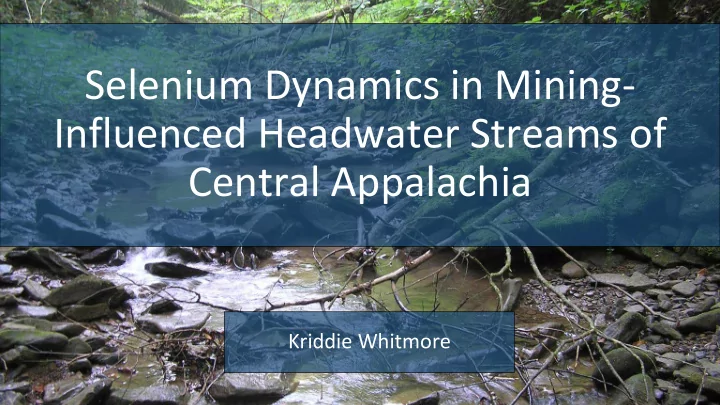

Selenium Dynamics in Mining- Influenced Headwater Streams of Central Appalachia Kriddie Whitmore
Selenium: Trace Element
Selenium: “Both a Nutrient and a Poison” • Essential to many life forms -from bacteria to humans • Used in formation of seleno-proteins and enzymes 3
Selenium: “Both a Nutrient and a Poison” • Toxic effects at only slightly elevated levels • Effects most pronounced in egg- laying vertebrates • Fish, birds, reptiles & amphibians • Juvenile deformities, reproductive failure 4
Case study: Belews Lake, NC • 1973: lake began receiving Se contaminated discharge water from coal burning plant • 19 out of 20 fish species lost in 4 years • Se concentration in water only 10x–20x uncontaminated sites 5
Determining Selenium Criteria • Challenges • Bioaccumulative tendency • Patterns of enrichment and bioaccumulation are controlled by site-specific factors • Few studies have been conducted in Appalachia Source: Aquatic Life Ambient Water Quality Criterion for 6 Selenium – Freshwater 2016
Selenium Mobilization Appalachian Coalfields Watershed • Se is enriched in rock deposits associated with coal seams • Mining exposes unweathered rock to rainfall • Se oxidizes, and becomes mobile stream sampling site
Selenium Enrichment 1. Dissolved Se enters stream reach Selenium concentration Water 8
Selenium Enrichment 1. Dissolved Se enters stream reach Selenium concentration Algae/ Microbes 1. Uptake by algae and microbes Enrichment dependent on site- specific ecosystem characteristics • Dissolved Se speciation • Site hydrology • Aquatic community composition Water 9
Selenium Enrichment Aquatic Vertebrate predator 1. Dissolved Se enters Aquatic Invertebrate stream reach Selenium concentration Algae/ Microbes 1. Uptake by algae and microbes Enrichment dependent on site- 1. Trophic transfer to specific ecosystem consumers characteristics • Dissolved Se speciation • Site hydrology • Aquatic community composition Water 10
Selenium Enrichment Aquatic Vertebrate predator 1. Dissolved Se enters Aquatic Invertebrate stream reach Selenium concentration Algae/ Microbes 1. Uptake by algae and microbes Enrichment dependent on site- 1. Trophic transfer to specific ecosystem consumers characteristics • Dissolved Se speciation • Site hydrology • Aquatic community composition Water 11
Research Questions 1. Is selenium enrichment and bioaccumulation occurring in headwater streams influenced by coal mining? 1. Do Se dynamics of enrichment and bioaccumulation vary among different levels of Se exposure? 12
Phase I Is Selenium bioaccumulating?
Phase I Methods • 23 Streams • water samples • 2 dragonfly taxa • Gomphidae • Cordulegastridae • Crayfish
Phase I Results Tissue Concentration (μg Se g -1 dry wt) • Positive relationship between dissolved Se Taxa Group in the water column and Se in tissue Gomphidae samples Cordulgastridae Cambaridae BDL Dissolved Se Concentration (μg Se l -1 )
Phase I Results High-Se Tissue Concentration (μg Se g -1 dry wt) Low-Se • Site selection Reference Taxa Group Gomphidae Cordulgastridae Cambaridae BDL Dissolved Se Concentration (μg Se l -1 dry wt)
Phase II Selenium Dynamics In Headwater Streams
Phase II Methods • 9 streams: 3 Reference, 3 Low-Se, 3 High-Se • 2 sampling seasons • Fall 2015, Spring 2016
Phase II Methods Phase II Methods • Media Collected • Water-column Water
Phase II Methods Phase II Methods • Media Collected Sediment/ Biofilm/ • Water-column leaf detritus • Sediment Water
Phase II Methods Phase II Methods • Media Collected Sediment/ Biofilm/ • Water-column leaf detritus • Sediment • Biofilm Water
Phase II Methods Phase II Methods • Media Collected Sediment/ Biofilm/ • Water-column leaf detritus • Sediment • Biofilm • Leaf detritus Water
Phase II Methods Phase II Methods Invertebrat e Invertebrate “predator” “prey” • Media Collected Sediment/ Biofilm/ • Water-column leaf detritus • Sediment • Biofilm • Leaf detritus • Macroinvertebrates • Crayfish Water
Phase II Methods • Macroinvertebrates identified and sorted into predator/prey taxa groups • All samples dried and ground • Acid digestion • Analysis on ICP-MS
25
26
27
Se criterion: whole body fish tissue 28
Conclusions • High Se in the water column result in high Se in the aquatic food chain • Enrichment and trophic transfer processes are concentration independent • Se is a potential stressor in mining-influenced headwater streams
Thanks Technical Assistance Funding: Field and lab help: • Virginia Water Resources Research • Julie Burger • Liz Sharp Center • Dave Mitchem • Megan Underwood • United States Office of Surface Mining • Jeffery Parks • Kyle Campbell Reclamation and Enforcement • Pat Donavan • Cole Sabin • Amy Gondron • Janelle Salapich • Tyler Weiglein • Ross Vander Vorste • Lindsey Nolan • David Jensen • Alex Grieve 30
Phase I Results • Positive relationship between conductivity and Se concentration in tissue samples • Macroinvertebrate Se macroinvertebrat concentrations in e mining-influenced sample Site Type streams tend to reference exceed those in stream reference streams
Phase II: Results • Differences between sampling seasons were minimal • Consistent pattern of elevated Se concentrations in streams influenced by coal mining
Water Column Phase II: Results • Differences Leaf Detritus between sampling Fall Spring Sediment Biofilm seasons were minimal • Pattern of elevated Se concentrations in streams influenced by coal Prey Predator Crayfish mining L H
Phase II: Results – Enrichment Factors
Recommend
More recommend